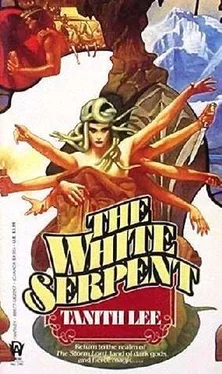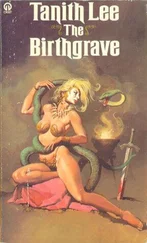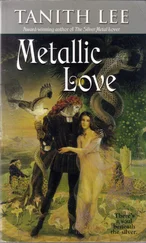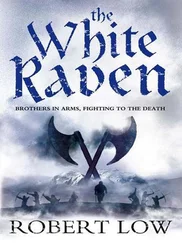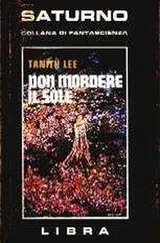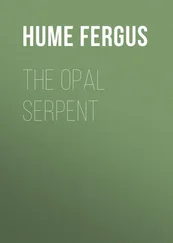Aztira glanced at him. She moved on into the round hall, and up into the stairwell. He, and he alone, went after her.
At the topmost level of the tower, the marble ended in a coal-black chamber. Here, on a pedestal, flames burned in a black bowl, in the manner of their temples. By the flame-light, nothing was revealed but for a silver bed, and lying on the bed, a man.
He could have been anyone of the Amanackire who waited below. Their unflawed faces had by now become all one face, males and females, duplicated over and over, saving only hers.
The man on the couch was breathing. Once, in every minute, his shoulders, the sharp line of the ribcage, were disturbed with motion.
Again, Aztira glanced at her companion. She put up her hand, as she had done in returning his caress. Now the hand was to stay him.
She approached the bier, and stood over it. To all appearances, she was a sister to the breathing corpse, so physically alike they were.
“Urhvan,” she said, aloud.
Her lids dropped over her eyes.
She was speaking within. Yet the chamber rang with the litany of her inner voice—entreaty, reassurance, insistence.
The man’s eyes opened without warning. They bulged. He let out a braying scream.
It was a noise of the arena. A sword had gone between the bladed armour of the bones, into the belly. A death cry, panic and disbelief, fury and denial.
“Urhvan,” Aztira said, again out loud, while the whirlpool of thought and energy soared and smote against the black room, and the glare of the flame-bowl flattened, flared.
The woman bowed over her struggling brother. Her hands settled to his forehead and his throat. His body shuddered and relapsed. He lay along the bed of death, as if dead once more, but now he breathed with a defeated regularity.
After a little while, Aztira drew back. As she did so, the man sat up sluggishly on the couch. His face was stupid. Then that slipped from him. He was in possession of himself. He was Amanackire. They gazed on each other and spoke with their minds. And the room sang.
The flame had steadied in its agate cup. In the eye-windows of the dog, the darkness was complete.
Soon, the Amanackire male got up from his couch. He looked about him, once, his eyes passing across the image of a dark man clothed in white without any attention. Before Aztira, the Amanackire made an obeisance of the Lowlands, the flight of one hand to brow and heart. Without any other show, he then went by her and down the inner stair.
The man and woman left behind in the tomb’s upper chamber confronted each other, also quite wordlessly. Until there thrust out of the nighttime groves of the burial garden beneath the thud of one huge atmospheric pulse—deafening as any shout.
“But you,” he said, “were alone.”
“I was alone, and in Alisaar.”
“Is it always an act of such violence?”
“Was it ever easy,” she said, “to be born? Urhvan canceled his own life twenty days ago, on the agreement of return. That has become the final ordeal. Those who dare to do it, and restore themselves, become the elect of Ashnesee. There are at present only ten of us, but eventually each will have met with and outwitted death. In nearby towers, some are lying who have couched with death a year, and longer. Their flesh stays pristine. Thus, the pledge. They will return. At the flickering of the life-spark, we go to them, to minister, those of us for whom the testing is already past.” Her eyes strayed to the blackness in the windows. “I suffered renewal alone, but I was spared the deed of suicide. A tavern-girl slew me to save you from my bane. I had only to accept her pitcher. She had even dressed it for me with lilies.”
He said, “Didn’t you think to ask that other favor of me. To wait for you.”
“Ah, no,” she said. “No.”
“Since you say you reckoned only on death.”
“Yes, maybe I am dishonest there. All my kind are warned. Any adept of my people might return out of the night. But then.” She looked down at the vacant bed of silver. “How unlikely it is, such a thing.”
He waited now, if not in Alisaar. At last he said to her, “Did you also want privacy for your return in anguish?”
She said, “I shrieked and rent myself with my nails. I didn’t know my name or who—or what I was. I thought myself an animal, a fish, a serpent, I thought that life was death, I was dying, and blood ran from my mouth and in absolute horror I attempted to tear free of the snare. No, no, I did not want your witness. The body weighs like lead. The seeing eyes are like sightlessness. To call out is to be dumb and to breathe is to suffocate. Anguish, agony. To die is better. And one day, I may die completely and be gone. But now—how shall I ever be sure? To live. That is our chastisement and our blessing. For you accused me truthfully. We are gods, my kind.” She put back her head and her hair spangled about her and her eyes were bloodless fires. The Power that streamed from her was like the rays of a winter moon. It was no more than a fact, what she had said to him in the inadequate language of men. “Eventually we will be as we were, as our history has us to be. There is a memory. It’s said we were winged. I nearly think it may be so. We have also traditions among us of lands above the sky, and that we rode from such places in chariots like stars, and will go back there, to reclaim many kingdoms. We dream of it. I, too, have done this. And when I dream—there are other colors there, which I—But I can describe none of them. And all those worlds will be ruled by my race. Without mercy or pity, until we fall or are pushed down again from our heights, and our wings are broken and our season finished. We heal of death. But there will be a death born from which even the Shadowless can never heal. For we shall be feared very much, and hated equally. Until the dawn of that death, then, the path lies upward. The cups of flame will burn before our untenanted altars, and those names we worship will be our own. We are gods. But Anackire is not a god. Anackire is everything, and of this the gods are only part.”
A twilight had come into her eyes, seeming to tint them, but not with colors—or with those indescribable colors of which she could not tell him.
“We are to be envied and despised,” she said. “You know it.”
He inclined his head.
“Vis will tremble,” she said. “But it will be worse, at last, for us. In the end, we shall be lost.” She held out her hands to him over the bier of her risen kindred. “So, we are alike, you and I, after all.”
When he went to her, she laid her head against his breast, as if she were tired and yearned to sleep.
“Before sunrise, you must be got out of this sorcerous unclean city. Rehger, I will send you by a safe road. To the sea. Nor far, my love. Will you trust me to do it?”
“Yes. But that’s for the morning.”
She said, in a whisper, “You have read my thoughts.”
The dry pond of the plain had gathered to itself a fragrance on that evening. It was the perfume, lacking all the myriad smudgings and stenches of humanity, of the distances of a starry sky and the ground swell of the metamorphosed foliage of Ashnesee.
They walked the ridges and defiles of the city.
She discovered for him, as they went by, the massive monuments, and gilded shrines, the fair diadem of the temple, with its bloom of inner fire. Where the palaces were aglow, sometimes the silhouettes of beings moved on the lights. (Often, the noble buildings stood void.) In a garden, now and then, like statuary alive, the pale Amanackire went up and down. They were in constant union and almost always separate.
Twice, Aztira came upon her fellows on the roadway. Some greeting was exchanged, naturally in total silence.
Читать дальше
